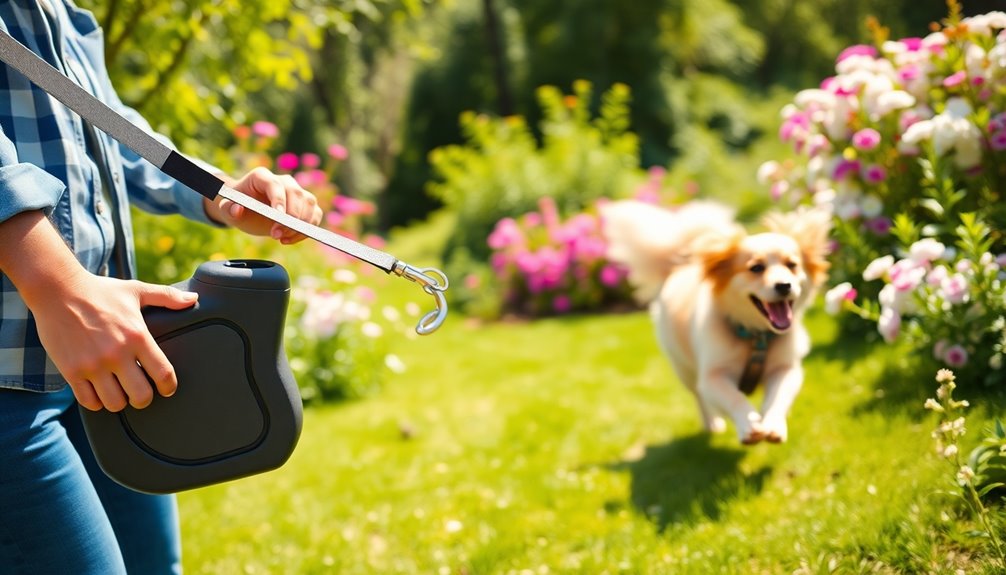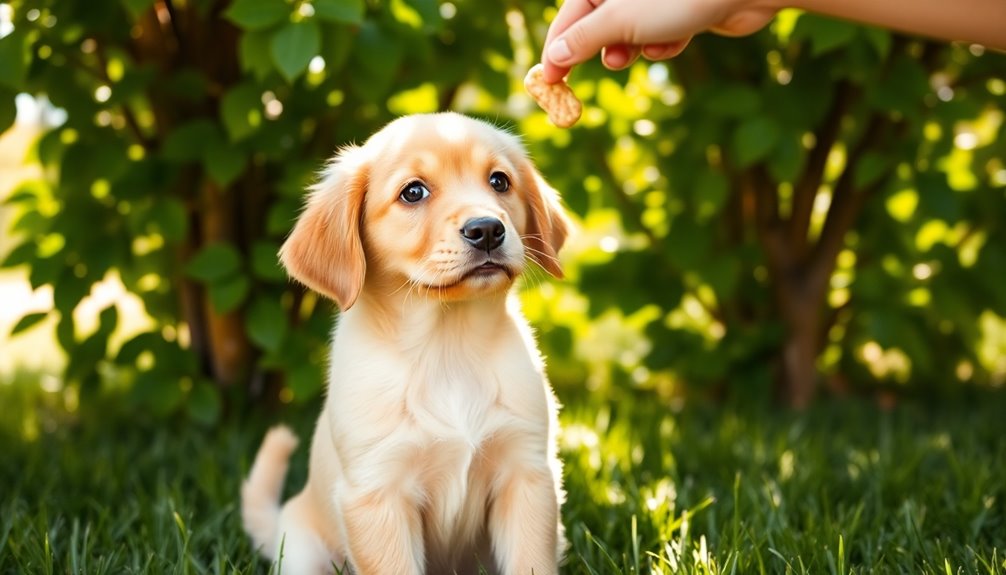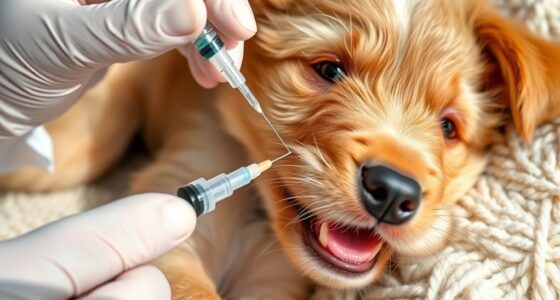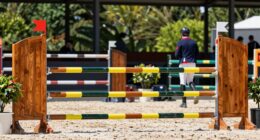You're giving your puppy the best start in life by focusing on key areas like early veterinary care, proper nutrition, and socialization. Start vaccinations at 6 to 8 weeks and schedule regular vet check-ups. Use positive reinforcement during training to foster good behaviors, and guarantee your puppy has daily exercise suited to their breed. Create a safe home environment by puppy-proofing and providing a cozy crate for comfort. Monitoring growth and maintaining a balanced diet are essential for overall health. If you explore further, you'll uncover additional tips to support your puppy's development and well-being.
Key Takeaways
- Start vaccinations and deworming early to protect your puppy from diseases and parasites during their critical growth period.
- Ensure proper socialization between 3 to 14 weeks to build confidence and reduce anxiety in new environments.
- Provide a balanced, high-quality puppy diet tailored to their breed size to support healthy growth and development.
- Implement positive reinforcement training techniques and crate training to foster a well-adjusted and obedient adult dog.
- Create a safe environment by puppy-proofing your home and establishing daily exercise routines to promote physical and mental well-being.

Midwest Homes for Pets 18-Inch iCrate for Tiny Breeds, Up to 10 lbs, Single Door Folding Dog Crate with Divider Panel, Leak-Proof Tray & Secure Latch, Portable, Durable & Easy to Assemble
IDEAL FOR UP TO 10 LB DOGS: Measures 18.5 x 12.5 x 14.5 inches – perfect for Maltese,…
As an affiliate, we earn on qualifying purchases.
As an affiliate, we earn on qualifying purchases.
Importance of Early Veterinary Care
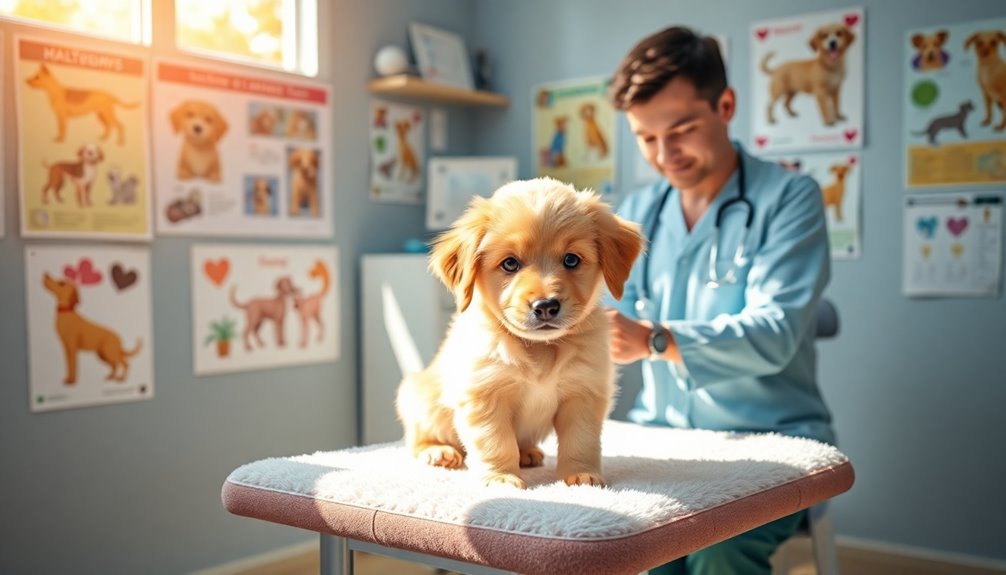
Early veterinary care is essential for your puppy's health and well-being. When you bring a puppy home, you've got to start their vaccinations between 6 to 8 weeks of age. This is significant because their initial immunity from their mothers fades quickly. Without timely vaccinations, your puppy could be at risk of life-threatening diseases.
Deworming medications are also important, so make sure you administer them at 2, 4, 6, and 8 weeks, followed by another round at 6 months to tackle any intestinal parasites.
Additionally, as soon as you welcome your puppy into your home, begin preventative measures against fleas, ticks, and heartworms to guard against serious health issues.
Regular wellness visits in your puppy's first year not only monitor their growth but also address any behavior concerns and help craft a tailored vaccination plan based on their lifestyle.

Blue Buffalo Life Protection Formula Puppy Dry Dog Food with DHA and ARA, Made with Natural Ingredients, Chicken & Brown Rice Recipe, 5-lb Bag
REAL CHICKEN FIRST: This Blue Buffalo dry dog food is made with real, high quality chicken as the…
As an affiliate, we earn on qualifying purchases.
As an affiliate, we earn on qualifying purchases.
The Role of Positive Reinforcement
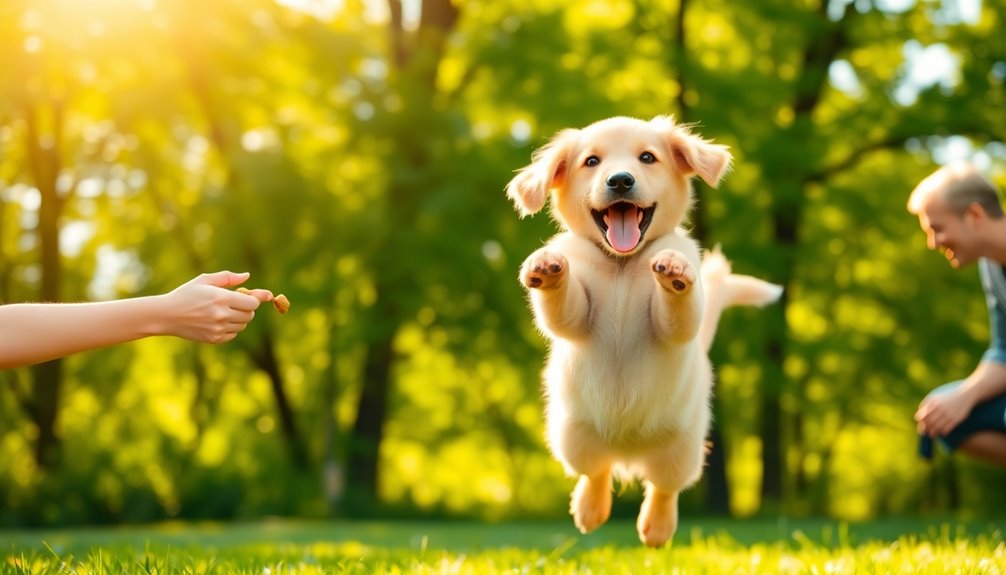
Harnessing the power of positive reinforcement can transform your puppy's training experience into a joyful journey for both of you. This method focuses on rewarding desired behaviors, which not only leads to quicker learning but also builds a lifelong bond between you and your furry friend.
By creating positive experiences during training, you'll help your puppy feel more confident and less anxious.
Here are four key benefits of using positive reinforcement in training your puppy:
- Fosters Good Behavior: Consistently rewarding your puppy with treats and praise encourages them to repeat those behaviors.
- Strengthens Your Bond: The emotional connection between you and your puppy deepens as they learn to associate training with positive outcomes.
- Encourages Adaptability: Puppies trained this way adapt better to new environments, people, and experiences, reducing anxiety.
- Enhances Learning: Positive reinforcement capitalizes on critical socialization windows (3 to 14 weeks), allowing your puppy to form positive associations. Additionally, regular outings to great places for puppy socialization can further support their development and confidence.

Safety 1st Safety Essentials Kit , White , 1 Count
Easy solutions to help you create a safer environment for your child
As an affiliate, we earn on qualifying purchases.
As an affiliate, we earn on qualifying purchases.
Socialization: Key to Confidence

Socialization is essential for your puppy's confidence, especially between 3 to 14 weeks of age.
By exposing them to different environments, sounds, and people during this time, you can set the stage for a well-adjusted adult dog.
Using treats to create positive interactions can make these experiences enjoyable and beneficial for their development. Additionally, incorporating Montessori-inspired principles can further enhance your puppy's learning and exploration during this critical period.
Early Exposure Benefits
How can you guarantee your puppy grows into a well-adjusted adult? The key lies in early exposure during that critical window of 3 to 14 weeks. Positive experiences at this age shape their future behavior, ensuring they develop into confident companions.
Here's how you can make the most of this formative period:
- Vary Environments: Introduce your pup to different settings, like parks or busy streets, to help them adapt to diverse stimuli.
- Meet People: Encourage interactions with a variety of people, including children and seniors, to foster comfort in social situations.
- Playdates: Arrange regular playdates with other vaccinated dogs. This helps your puppy learn important social skills and reduces future aggression tendencies.
- Use Treats: Reinforce positive experiences by rewarding your puppy with treats. This creates positive associations and boosts their confidence in new situations.
Positive Interaction Strategies
Creating positive interactions is essential for your puppy's development. During the critical window of 3 to 14 weeks, exposing your puppy to various environments, sounds, and people can greatly reduce future anxiety and behavioral issues.
Use positive interaction strategies like offering treats to create positive associations with new experiences. This encourages your puppy to engage without fear.
Playdates with other vaccinated dogs are invaluable. They provide structured socialization opportunities, helping your puppy learn good manners and social skills.
Puppy classes also offer a safe space for your pup to interact with peers under your guidance.
Don't forget regular walks in different neighborhoods and visits to dog parks. These outings promote ongoing social interaction, boosting your puppy's confidence in various situations.
Just like you pay attention to puppy food for proper nutrition, prioritize these positive interactions for emotional growth.

Buddy Biscuits Trainers 10 Oz. Pouch of Training Bites Soft & Chewy Dog Treats Made with Bacon Flavor
Highly Palatable with natural pork liver base
As an affiliate, we earn on qualifying purchases.
As an affiliate, we earn on qualifying purchases.
Essential Nutrition for Puppies
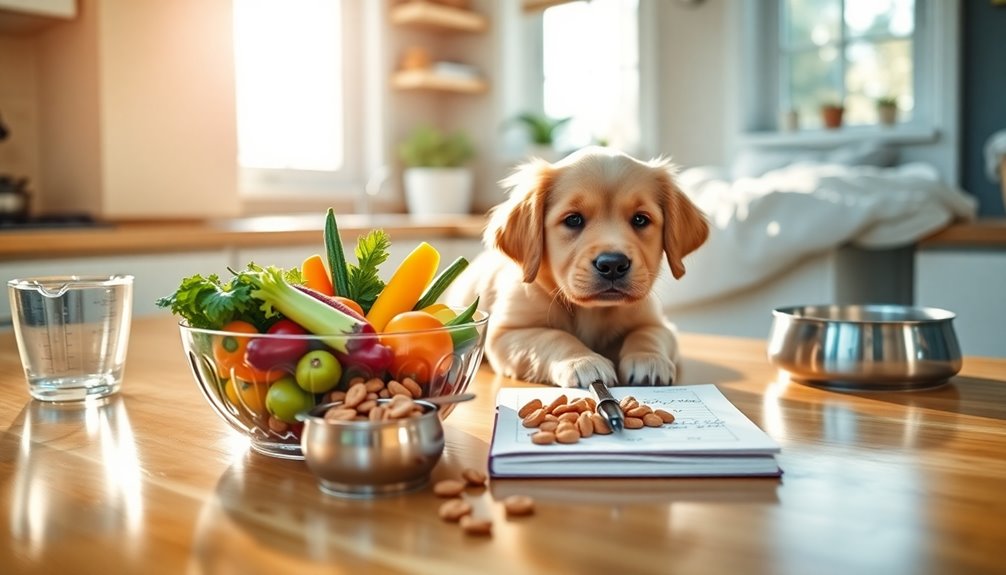
When it comes to your puppy's nutrition, a balanced diet is essential for their growth and development.
You should steer clear of feeding them human food, as it often contains unhealthy ingredients that can harm them.
Instead, focus on high-quality puppy food that meets their specific needs.
Balanced Diet Requirements
Providing your puppy with a balanced diet is essential for their growth and overall health. Puppies have unique nutritional needs, so meeting these balanced diet requirements is vital.
Here are four key points to keep in mind:
- High-Quality Food: Choose food that meets PFMA standards, ensuring it's complete and balanced for your puppy's specific growth stage.
- Breed-Specific Needs: Nutritional requirements vary by breed size. Giant breeds need careful calcium and phosphorus ratios for bone health, while smaller breeds benefit from specialized kibble.
- Wet vs. Dry Food: Incorporate wet food for added moisture and fewer calories, and use kibble to help maintain dental health and as training treats.
- Veterinarian Consultation: Always consult with your vet to create a tailored dietary plan that suits your puppy's specific needs and growth phases.
Avoid Human Food
Avoiding human food is vital for your puppy's health and development. Many human meals are packed with high fat, sugar, and salt, which can disrupt the balanced diet your puppy needs for healthy growth. Sharing your leftovers might seem harmless, but it can lead to nutrient deficiencies, as those meals aren't formulated for puppies' specific dietary needs.
Additionally, some human foods are downright dangerous. Items like chocolate, grapes, onions, and garlic are toxic to dogs and can cause severe health issues. Keeping these harmful foods out of reach is essential for your puppy's safety and well-being.
To guarantee your puppy thrives, focus on providing a balanced diet exclusively made up of high-quality puppy food. This is especially important during their formative months, as proper nutrition directly influences their overall health and development.
Crate Training for Independence
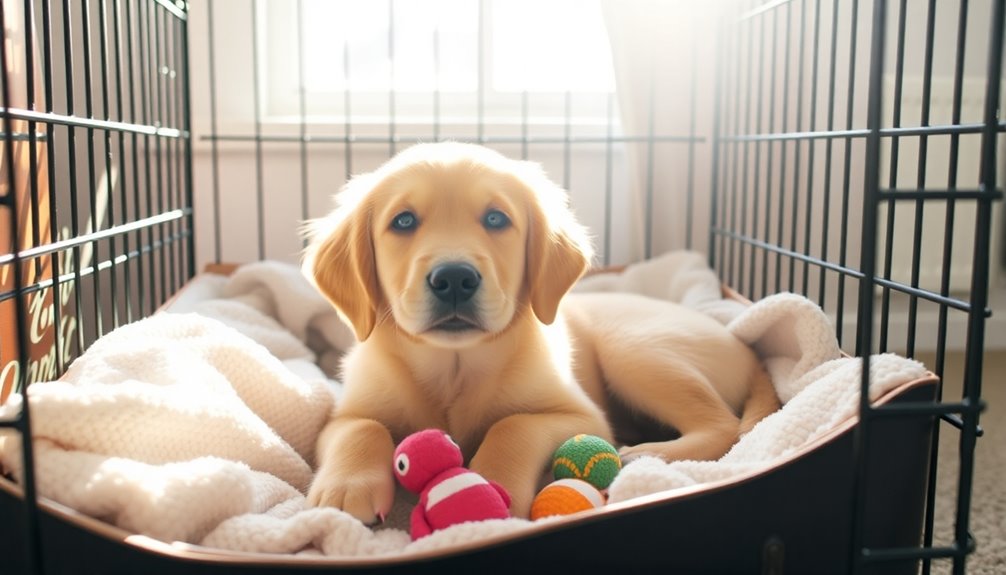
Crate training can be a game changer for your puppy's independence. By providing your pup with a safe, cozy space, you help them feel secure when left alone. A properly sized crate allows them to stand, turn around, and lie down comfortably, encouraging them to see it as their den, not confinement.
To make the most of crate training, consider these tips:
- Use Positive Reinforcement: Reward your puppy with treats and praise immediately after bathroom breaks to reinforce good behavior.
- Gradually Increase Crate Time: Puppies can hold their bladder for about one hour per month of age. Gradually extend their time in the crate to help them adjust.
- Add Cozy Items: Place blankets or toys inside the crate to create a comfortable environment, promoting a positive association.
- Be Consistent: Establish a routine for crate time, helping your puppy understand when it's time to relax.
With patience and consistency, crate training won't only foster your puppy's independence but also ease their adjustment to being alone, setting the stage for a well-adjusted adult dog.
Proper Handling and Grooming
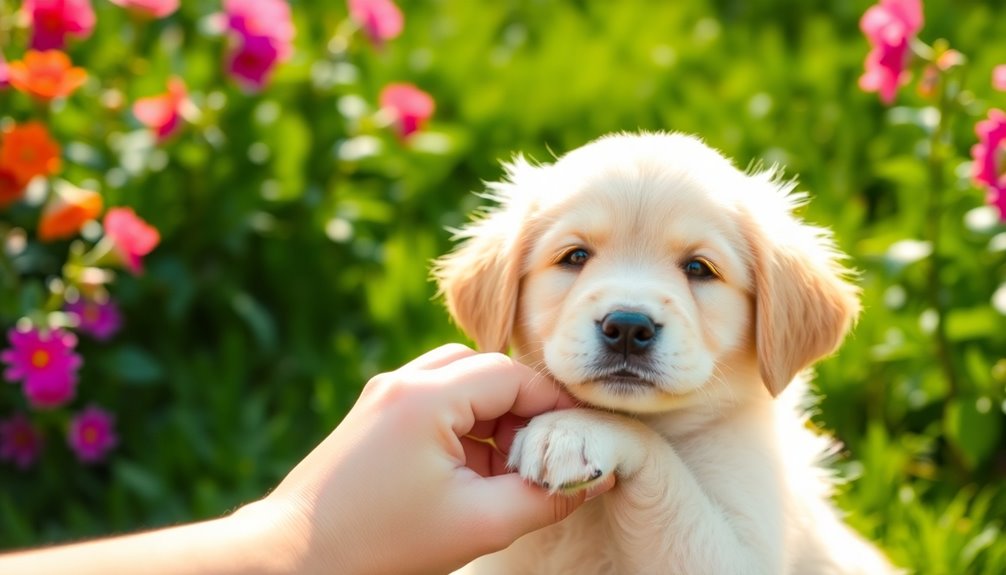
Grooming your puppy is crucial for their health and wellbeing, as it fosters both comfort and confidence. Early acceptance of grooming practices makes a world of difference, helping your puppy become accustomed to handling and reducing future struggles during grooming sessions.
Establish a routine to create a sense of security for your puppy and strengthen the bond between you.
Make grooming a positive experience by pairing sessions with praise and treats. This approach helps your puppy associate grooming with good things, making it enjoyable rather than stressful.
Techniques for distraction, like offering peanut butter during baths, can ease anxiety and promote a calm environment.
Regular grooming tasks, including brushing, ear cleaning, and nail trimming, are essential for maintaining your puppy's health and hygiene. Additionally, establishing a consistent routine can help your puppy feel more secure and comfortable during grooming sessions.
Exercise and Physical Activity
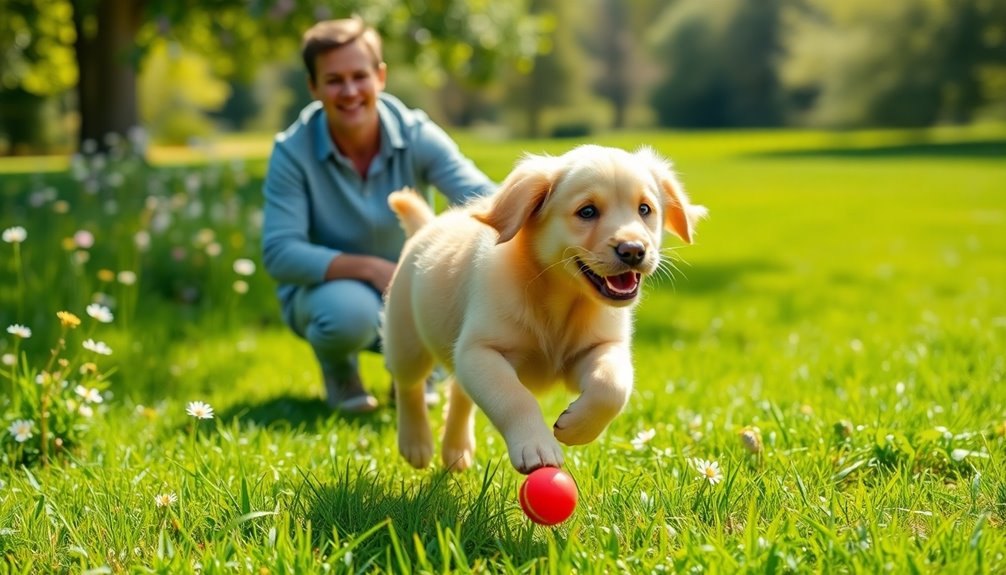
Getting your puppy the right amount of daily exercise is essential for their growth and happiness.
Different breeds have unique activity needs, so knowing your puppy's requirements will help you plan fun playtime activities that suit them.
Daily Exercise Requirements
Puppies need daily exercise to thrive, and their requirements can vary considerably based on breed, age, health, and personality. Energetic breeds like Border Collies will demand more physical activity compared to smaller or less active breeds.
Regular exercise supports muscle and bone development, ensuring your puppy grows into a healthy dog while reducing the risk of obesity-related health issues later in life.
Here are some guidelines for meeting your puppy's daily exercise needs:
- Age-Based Exercise: Follow the rule of 5 minutes of exercise per month of age, up to twice a day. For example, a four-month-old puppy needs about 20 minutes daily.
- Engaging Activities: Incorporate short walks, playtime, and interactive games to enhance mental stimulation and socialization.
- Gradual Increase: As your puppy grows, gradually increase the intensity and duration of exercise to promote physical fitness.
- Routine: Establish a consistent exercise routine to help your puppy adjust and thrive in their environment.
Fun Playtime Activities
Daily exercise isn't just about walking; it's also a fantastic opportunity for fun playtime activities that keep your puppy engaged and healthy. Short, gentle walks combined with interactive games like fetch or tug-of-war provide essential physical exercise while strengthening the bond between you and your puppy. These activities help your puppy burn off excess energy and support muscle and bone development.
Don't forget about mental stimulation! Incorporating puzzle toys and training sessions into your routine keeps your puppy's mind sharp and promotes healthy cognitive development. Social playdates with other vaccinated dogs are another great way for your puppy to learn appropriate social behaviors. These interactions enrich their lives and contribute to overall well-being.
Establishing a consistent exercise routine helps prevent obesity and related health issues in your puppy. Make sure to tailor your fun playtime activities to match your pup's energy level and breed characteristics.
Breed-Specific Exercise Needs
Understanding your puppy's breed-specific exercise needs is vital for their overall health and happiness. Different breeds have varying energy levels and physical requirements. For instance, high-energy breeds like Border Collies need up to 2 hours of exercise daily, while smaller breeds might only need 30 minutes to an hour.
Here are some key points to take into account when determining your puppy's exercise needs:
- Growth Stages: Adjust exercise based on age; young puppies shouldn't overexert themselves.
- Activity Type: Structured routines, like fetching or agility training, can benefit breeds designed for specific tasks, such as hunting or herding.
- Size Matters: Large breeds, like Great Danes, require moderate activity during growth to avoid joint issues.
- Behavioral Balance: Regular exercise is essential for preventing behavioral problems, especially in more active breeds. Additionally, incorporating ride-on car toys can provide a fun way for puppies to engage in physical activity and stimulate their motor skills.
Puppy-Proofing Your Home
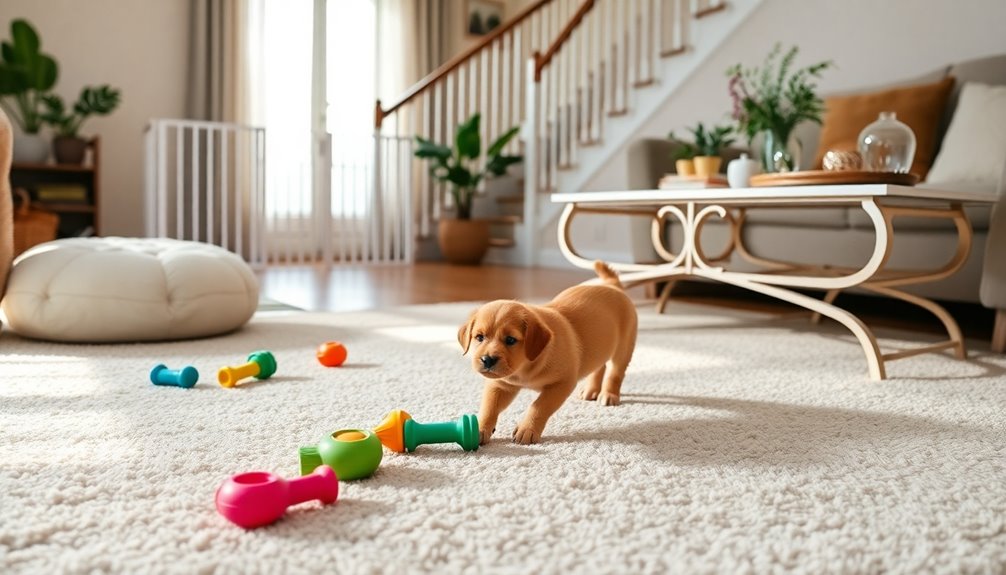
Creating a safe environment for your new puppy involves careful planning and a bit of effort. Puppy-proofing your home is essential to prevent accidents and injuries. Here are some key steps to take into account:
| Hazardous Items | Safety Measures |
|---|---|
| Electrical cords | Hide or secure cords from reach |
| Cleaning supplies | Store in locked cabinets |
| Small objects (e.g., coins) | Keep out of reach, use storage bins |
| Shoes and furniture | Store away or use deterrent sprays |
| Trash cans | Secure with lids or store away |
| Food items | Keep in high cabinets |
| Stairs and unsafe rooms | Install baby gates |
| Windows and balconies | Verify screens and locks are secure |
Monitoring Growth and Health
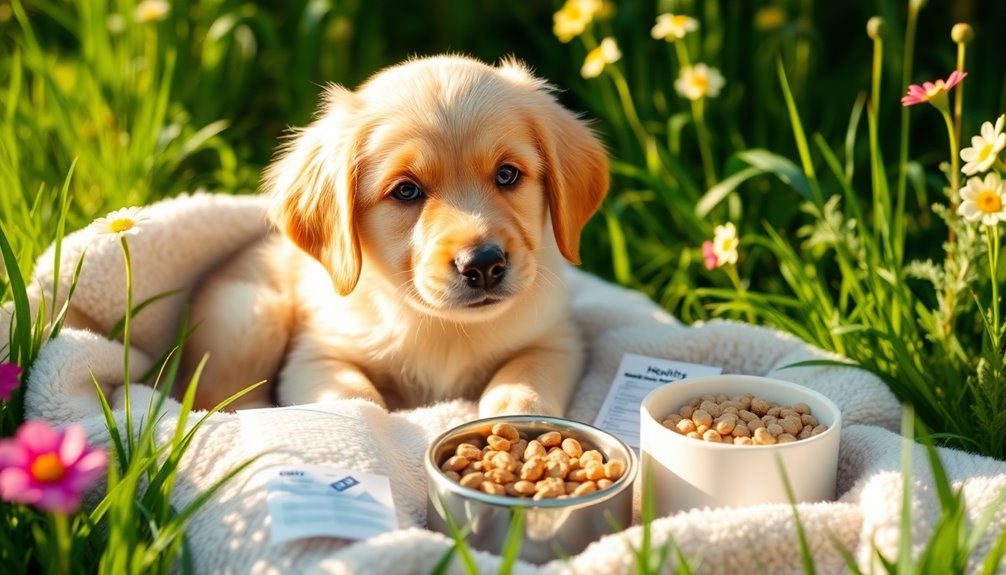
Once you've made your home safe for your new puppy, it's important to keep a close eye on their growth and overall health.
Monitoring growth is essential to guarantee your puppy develops into a healthy dog, preventing obesity-related health issues down the line. Here are some key steps to help you along the way:
- Utilize Growth Charts: Work with your vet to use puppy growth charts that track healthy development and ideal adult weight.
- Schedule Regular Vet Check-ups: These appointments confirm vaccinations and deworming are on schedule, laying a solid health foundation for your puppy.
- Consider Genetic Testing: Early detection of potential health problems through genetic screenings, like Wisdom Panel, can identify risks affecting growth and development.
- Maintain a Balanced Diet: A proper diet supports a healthy microbiome, which is essential for overall health.
Imbalances can lead to various health issues in puppies.
Understanding Breed-Specific Needs
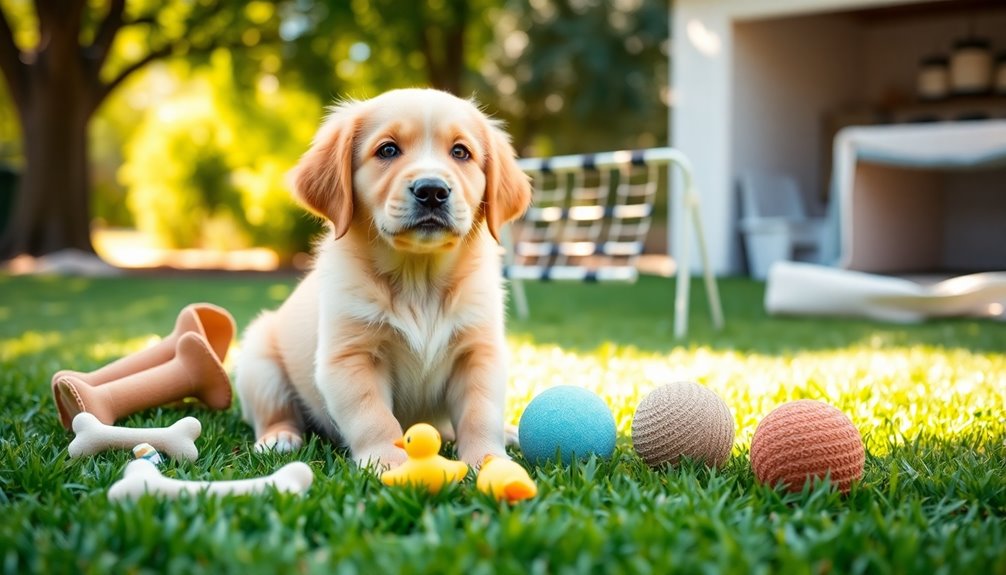
When you bring a puppy into your home, it's important to recognize that each breed has its own specific needs. Understanding these breed-specific needs will help you raise a healthy dog.
For instance, giant breeds need a careful balance of calcium and phosphorus to support their bone development, while smaller breeds require specialized kibble suited for their tiny teeth and weaker jaws.
Larger breeds usually have a prolonged growth period, lasting up to two years, which means you'll need a thoughtful dietary plan to prevent issues like hip dysplasia.
On the other hand, smaller breeds often shift to adult food by 9 to 12 months, while giant breeds should stay on puppy food longer.
Additionally, consider the energy levels of your puppy's breed. High-energy breeds, like Border Collies, demand more exercise and mental stimulation compared to those with lower energy needs.
This affects not only their training but also their socialization requirements. By tailoring your approach to meet your puppy's unique needs, you're setting them up for a well-adjusted and healthy life.
Frequently Asked Questions
How to Give Your Puppy the Best Life?
To give your puppy the best life, focus on socialization, positive reinforcement training, and a balanced diet.
Expose them to different people, environments, and sounds for confidence. Use treats and praise to encourage good behavior and strengthen your bond.
Schedule regular vet visits for vaccinations and health checks, and make sure they get daily exercise and playtime to meet their energy needs.
A happy, healthy puppy thrives with your love and attention!
Are Dogs Happier With a Second Dog?
Dogs definitely derive delight from having a second dog around.
Companionship creates a cozy, caring environment where they can play, socialize, and learn from one another. You'll notice less destructive behavior and lower stress levels, especially when they're left alone.
Just guarantee you introduce them properly; compatible canines can forge fantastic friendships that enrich their lives.
Ultimately, two dogs can double the joy and happiness in your home!
At What Stage Are Puppies Most Difficult?
Puppies are often most difficult between 3 to 6 months old. During this phase, they're teething and bursting with energy, which can lead to behavioral challenges.
You might notice them testing boundaries, so consistent training is essential to establish good habits.
Socialization is also important; exposing them to various environments during this time helps prevent future anxiety.
Using positive reinforcement can effectively tackle common issues like nipping and jumping, making the change smoother.
What Is the 10 Minute Rule for Puppies?
Imagine your puppy as a delicate flower, needing just the right amount of sunlight to flourish.
The 10 Minute Rule suggests you give your pup about 5 minutes of exercise for each month of their age, twice a day. For instance, if your puppy's 3 months old, aim for 15 minutes per session.
This way, you'll nurture their growth, prevent injuries, and foster a strong bond through engaging play tailored to their needs.
Conclusion
In giving your puppy the best start, remember that a blend of care creates confident companions. Prioritize early veterinary visits, practice positive reinforcement, and provide proper nutrition. Socialize your pup, guarantee exercise, and embrace crate training for independence. Puppy-proof your home, monitor their growth, and understand their unique needs. By fostering a fulfilling foundation, you'll cultivate a loving and lively lifelong bond with your furry friend. Start strong, and your pup will flourish!


